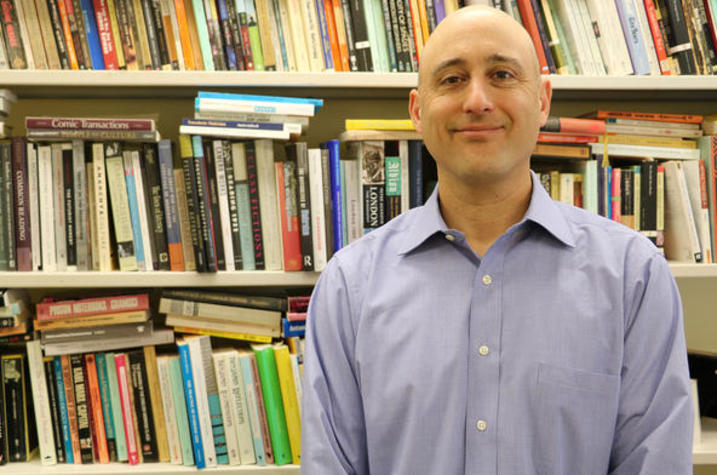English professor explores how Cold War policies helped create post-colonial literature

LEXINGTON, Ky. (Oct. 28, 2022) — How did superpower competition and the Cold War impact writers in the decolonizing world?
Peter Kalliney, William J. and Nina B. Tuggle Chair in the Department of English in the College of Arts and Sciences at the University of Kentucky, has been searching for answers to that very question after receiving Guggeinheim and National Endowment for the Humanities Fellowships.
His research can be found in his latest book, "The Aesthetic Cold War: Decolonization and Global Literature," which examines how the United States and the Soviet Union — in an effort to entice writers — funded arts centers, international conferences, book and magazine publishing (including the Paris Review), literary prizes and radio programming. Their international spy networks, however, subjected these same writers to intimidation and surveillance by tracking their movements, tapping their phones, reading their mail and censoring or banning their work.
Although conventional wisdom suggests that Cold War pressures stunted the development of postcolonial literature, Kalliney’s extensive archival research shows that evenly balanced superpower competition allowed savvy writers to accept patronage without pledging loyalty to specific political blocs. Likewise, writers exploited rivalries and the emerging discourse of human rights to contest the attentions of the political police.
“In the sphere of arts and letters, the Cold War exerted two opposing pressures on intellectuals from decolonizing regions: new opportunities for global circulation through cultural diplomacy programs, on the one hand, and increasingly severe sanctions, including surveillance, censorship and imprisonment, on the other hand," Kalliney explained. "Large states made an unprecedented effort to court writers from the decolonizing parts of the world. Yet these very same writers faced significant political pressures both at home and as they traveled.”
In response to this influence, many writers from Africa, Asia and the Caribbean, including Chinua Achebe, Mulk Raj Anand, Eileen Chang, CLR James, Alex La Guma, Doris Lessing, Ngũgĩ wa Thiong’o and Wole Soyinka, carved out a conceptual space of aesthetic nonalignment — imagining a different and freer future for their work.
You can learn more about Kalliney's work and his book, published by Princeton University Press, through a podcast found here.
As the state’s flagship, land-grant institution, the University of Kentucky exists to advance the Commonwealth. We do that by preparing the next generation of leaders — placing students at the heart of everything we do — and transforming the lives of Kentuckians through education, research and creative work, service and health care. We pride ourselves on being a catalyst for breakthroughs and a force for healing, a place where ingenuity unfolds. It's all made possible by our people — visionaries, disruptors and pioneers — who make up 200 academic programs, a $476.5 million research and development enterprise and a world-class medical center, all on one campus.




